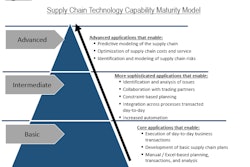Average companies include nearly nine times too many metrics, focus heavily on historical finance data, not enough on forward-looking indicators
Atlanta, GA — October 22, 2004 — Fewer than 20 percent of all typical companies have mature balanced scorecard implementations in place that are generating business value, according to new research from The Hackett Group.
At their most effective, balanced scorecards can be powerful tools, providing concise, predictive and actionable information about how a company is performing and may perform in the future, and world-class companies are 159 percent more likely than typical companies to have mature balanced scorecards in place, according to Hackett's 2004 Finance Book of Numbers research.
But the full benefits of effective balanced scorecards are not being realized for more than 80 percent of typical companies examined by Hackett. Primary reasons include too many metrics and overweighting the scorecards with historical financial information.
According to Hackett, companies report an average of 132 measures to senior management each month — nearly nine times the number of measures in most effective balanced scorecards. In addition, half the metrics companies rely on are driven by internal financial data, which place far too much weight on historical performance and not enough emphasis on forward-looking measures such as external financial and operating performance.
"Given the way the concept of the balanced scorecard has evolved in practice, it is no wonder that many financial executives look on the concept as an expensive, bloated and useless substitute for the traditional paper reports," said Hackett Senior Business Advisor John McMahan. "Most companies get very little value out of balanced scorecards, because they haven't followed the basic rules that make them effective."
Hackett Finance Practice Leader Cody Chenault said: "If you're tracking nine times the recommended number of metrics, you're confusing detail with accuracy, and it's going to be almost impossible to see indicators that might emerge from the data."
Chenault said that companies make the mistake of relying heavily on historical internal finance data. "It's what they understand best and are the most comfortable with. But by putting little weight into forward-looking internal and external metrics, such as sales forecasts, market share, competitor pricing and broad economic indicators, companies sabotage their own balanced scorecard efforts. They create a system that's about as effective as driving with the windshield covered while looking in the rearview mirror."
The Hackett Group, an Answerthink company, is a business advisory firm providing empirically based advice and best-practices research to executives seeking to drive world-class performance in areas such as finance, IT, human resources, and procurement.
Atlanta, GA — October 22, 2004 — Fewer than 20 percent of all typical companies have mature balanced scorecard implementations in place that are generating business value, according to new research from The Hackett Group.
At their most effective, balanced scorecards can be powerful tools, providing concise, predictive and actionable information about how a company is performing and may perform in the future, and world-class companies are 159 percent more likely than typical companies to have mature balanced scorecards in place, according to Hackett's 2004 Finance Book of Numbers research.
But the full benefits of effective balanced scorecards are not being realized for more than 80 percent of typical companies examined by Hackett. Primary reasons include too many metrics and overweighting the scorecards with historical financial information.
According to Hackett, companies report an average of 132 measures to senior management each month — nearly nine times the number of measures in most effective balanced scorecards. In addition, half the metrics companies rely on are driven by internal financial data, which place far too much weight on historical performance and not enough emphasis on forward-looking measures such as external financial and operating performance.
"Given the way the concept of the balanced scorecard has evolved in practice, it is no wonder that many financial executives look on the concept as an expensive, bloated and useless substitute for the traditional paper reports," said Hackett Senior Business Advisor John McMahan. "Most companies get very little value out of balanced scorecards, because they haven't followed the basic rules that make them effective."
Hackett Finance Practice Leader Cody Chenault said: "If you're tracking nine times the recommended number of metrics, you're confusing detail with accuracy, and it's going to be almost impossible to see indicators that might emerge from the data."
Chenault said that companies make the mistake of relying heavily on historical internal finance data. "It's what they understand best and are the most comfortable with. But by putting little weight into forward-looking internal and external metrics, such as sales forecasts, market share, competitor pricing and broad economic indicators, companies sabotage their own balanced scorecard efforts. They create a system that's about as effective as driving with the windshield covered while looking in the rearview mirror."
The Hackett Group, an Answerthink company, is a business advisory firm providing empirically based advice and best-practices research to executives seeking to drive world-class performance in areas such as finance, IT, human resources, and procurement.








